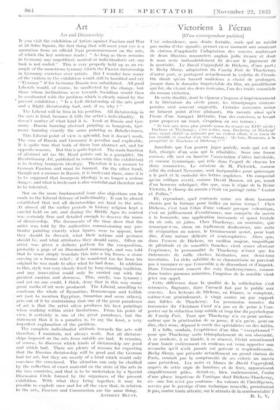Art and Dictatorship
IF you visit the exhibition of Artists against Fascism and War at 2a•Soho Square, the first thing that will meet your eye is quotation from an ollicial Nazi pronouncement on the arts, of which the key sentence reads : " As long as there remains in Germany any unpolitical, neutral or individualistic art, our task is not ended." This is very properly held up as an ex- maple of the monstrous tyranny which the Faseistdictatorship in Germany exercises over artists. But I .wonder how many of the visitors to the exhibition would still be horrified and cry ,"Tyraimy" if for Germany Russia.was substituted.. All good Liberals would, of course,. be unaffected by the change, . but those whose inclinations were towards Socialism would then be confronted with the problem which is clearly raised by the present exhibition : " Is a Left dictatorship of the arts good and a Right dictatorship bad, and, if so, why ? "
The Liberal will be firm in his position. All dictatorship in the arts is fatal, because it kills the artist's individuality. It doesn't matter of what kind it is. Look at Russia and Ger- many --Russia banning abstraat painting as bourgeois, Ger- many banning exactly the seine painting as Bols.chevismas.
This Liberal point of view is splendid, but it doesn't work. The ease of Russia and Germany is peetiliar and explicable. It is quite true that both of them ban abstract art, and for Apposite reasons. But this is quite logical. The.main function of abstract art (as Mr. Read points Out in a pamphlet. On Revolutionary Art, published in connexion with the exhibition) is to destroy bourgeois ideology. Therefore it is a menace to German Fascism and must be banned. On the other hand, though not a menace in Russia, it is irrelevant there, since it is to he supposed that bourgeois ideology is no longer a serious danger, and what is irrelevant is also wasteful and therefore not 16 lie tolerated.
But on the more fundamental issue also objections can be made to the Liberal defence of individuality. It can be almost established that not all dictatorships are fatal to the arts. At almost all the earlier periods in history religion kept a careful hold on art, and during the Middle Ages its control was certainly firm and detailed enough to deserve the name of dictatorship. The documents of the time show that the artist was told 'by the authorities commissioning any par- icular painting exactly what figures were to appear, how they should be dressed, what their actions and gestures should he, and what attributes they should carry. Often an artist was given a definite pattern for the composition, probably a page Of an illuminated manuscript, and was told that he must simply translate this into a big fresco, a stone carving or a bronze relief ; if he wandered too far from his original he was made to alter what he had done. In addition to this, style was very closely fixed by long-standing tradition, and any innovation could only be carried out with the greatest caution and slowness. This, surely, was tyranny ; and yet no one could, I think, deny that in this way many great works of art were produced: • The Liberal, unwilling to 1'n11(kllln the whole of Byzantine, Romanesque and Gothic art (not to mention Egyptian, Sumerian and some others), gets out of it by maintaining that one of the great paradoxes of art is that the artist often produces his best paintings when working within strict: limitations. Faloin his point of view, it certainly is one of the great paradoxes, but the statement that it is a paradox is, to say the least, a -very imperfect explanation of the problem..
The complete individualist attitude towards the arts will therefre, I maintain, not always work. Not all dictator- ships imposed on the 411'18 from outside are bad. It remains, of coarse, to discover which kinds of dictatorship are good and which bad. There are plenty of reasons for expecting that the Russian dictatorship will be good and the German had for art, but they are mostly of a kind which would only eonvince the convinced. The situation can only be clarified by the collection of' exact material on the state of the arts in the two countries, .ancl. that is to•he midertaken by a Special Discussion Circle rimmed by the organisers of the present exhibition. With what they bring together, it may be possible to explode once and for all the view that, in relation to the arts, Fascism and Communism are the same thing.
ANTHONY BLUNT.






























































































 Previous page
Previous page